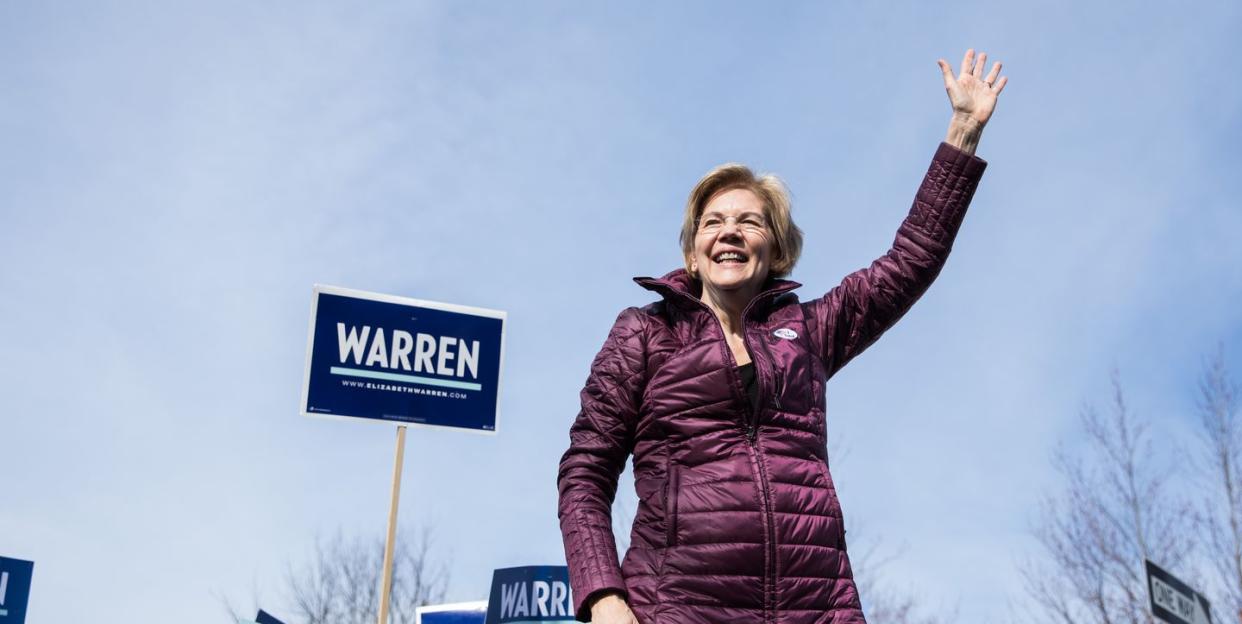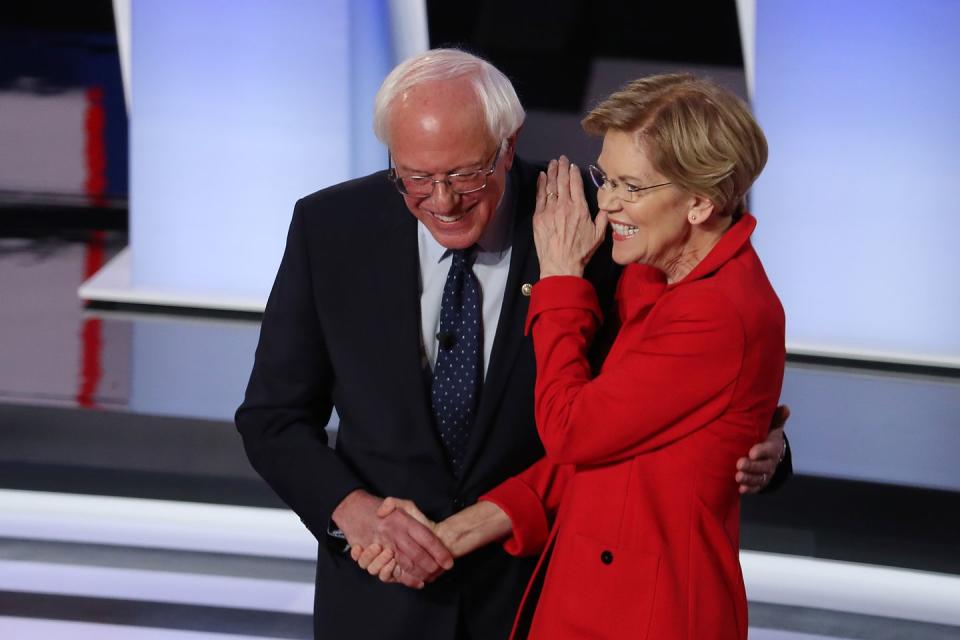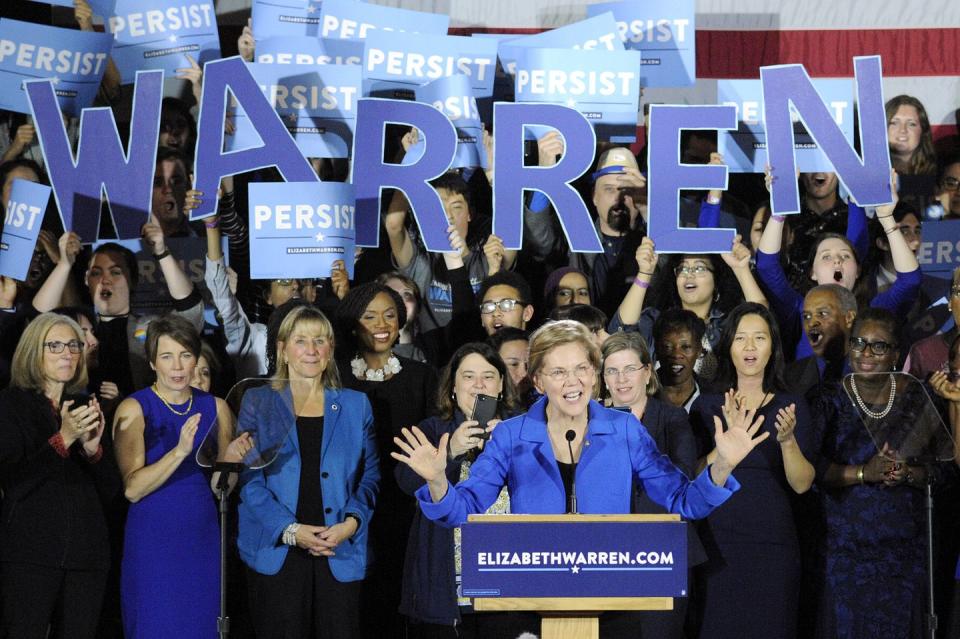The End of Warren's Campaign Sucks For Progressive Swing Voters Like Me

A few Sundays ago, I got a text from Elizabeth Warren’s campaign: “Elizabeth will be calling 15 supporters!” it chirped. “Tell her what this fight means to YOU.” I was in a contemplative mood and began to wonder: What does this “fight” mean to me? I really liked Warren. She stood for a lot of things I did: universal health care and child care, wealth redistribution, the Green New Deal, abortion rights. I’d be happy to vote for her.
But all I could think about was an entirely other “fight”—the one she was having with another candidate. She never called, but I would have said: “Please make up with Bernie!”
I thought about this moment on Thursday, when Elizabeth Warren ended her campaign for president. I realize that, in some sense, this would have been an impossible ask; both Warren and Bernie Sanders were running for president, and someone had to pull ahead. But the primary had gotten ugly. The two candidates’ non-aggression pact was a thing of the past. Their supporters’ online sniping had reached a fever pitch, and many of my friends were arguing IRL. At a recent debate, Warren and Sanders had confronted each other about whether or not he’d told her a woman couldn’t win; the tension prompted memes wishing Mom and Dad would stop fighting, to which I strongly related. I wasn’t just worried about zero-sum poll numbers or the left eating its own; for me, the hostility elicited an emotional reaction.

I’ve spent most of this nerve-wracking primary season with an identity I never thought possible: swing voter. I liked not one but two candidates in the race. I appreciated Warren’s many far-reaching plans, but I also admired Sanders’ moral clarity and uncompromising message. While neither Sanders nor Warren were perfect, they were both saying things I’d never heard from presidential candidates before. In retrospect, this was no less than a profound experience.
I typically hold the jaded position that politicians are by definition fake, mealy-mouthed, and never progressive enough. I’ve often thought you have to be somewhat of a mentally ill megalomaniac to think you, of all people, should be president. Election seasons have never inspired me. Even back in 2008—when I was 24, desperately broke, and loathed George W. Bush—the nicest thing I had to say about Barack Obama was (as I put it in a Gchat to a friend) that he “didn’t stand for much” but “would be a symbolic leader.” To be fine—no, happy!—with more than one person for president felt like an embarrassment of riches.
So you’d think that once Elizabeth Warren dropped out of the race, I’d feel good immediately committing to Sanders. But I didn’t. I spent the day feeling extremely sad. It wasn’t only that Warren’s downfall felt unavoidably linked to sexism and our skewed sense of “electability” (though that was certainly true). It wasn’t only that I felt lonely because people like me, who stanned both the preacher and the teacher, seemed increasingly drowned out by die-hard fans of one side. The main source of my depression was that Warren’s departure was a decisive blow to my tag-team fantasy of a unified, above-the-fray leftist movement.
The happiest I felt during this election was sometime in the fall, when both Bernie and Liz were frontrunners. This was before anyone was voting, before I started to obsess over election math or unity. This felt different than 2016, when I gladly voted for Bernie Sanders in the primary, but still had a nagging feeling that he was the exception to the rule. To me, the fact that two progressives were doing so well signaled a true realignment, a shift in the Overton Window of acceptable political discourse, rather than Bernie as a singular way forward. Instead, I was having corny visions of a progressive Mount Rushmore—not just one leader but a cluster of clear ideological allies. It felt like I was experiencing history, not a horse race, an actual movement rather than just another dumb election. “All of the Democrats are scared shitless to actually say something worthwhile, it’s pathetic,” cynical 24-year-old me had grumbled to the same Gchat friend. It didn’t feel like that anymore.

Now that Warren is out, I’m nervous again that a leftward shift rests on one man’s shoulders. As of now, Mom and Dad are still cooling their heels; Sanders has sent a couple of flattering, no-pressure tweets, while Warren has, at least for now, resisted talk of an endorsement. I hope Warren comes around and Sanders surrogates do the work of courting her supporters, not only because many of them overlap with Bernie’s, but precisely because many of them don’t. Their somewhat distinct constituencies are proof that progressive politics is a lot bigger than a "cult" of Bernie. Regardless of what happens in November, or the next time a progressive runs for president, the rise of two septuagenarians gave me something that even 2008, the year of young voters, couldn’t: hope.
You Might Also Like

